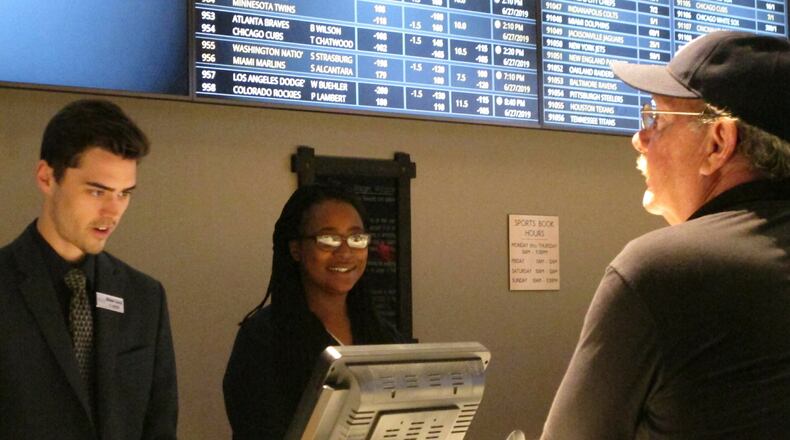Four of Atlanta’s major professional sports franchises are putting their weight behind an effort to allow betting on games.
Presidents of the Atlanta Braves, Atlanta Falcons, Atlanta Hawks and Atlanta United have formed the Georgia Professional Sports Integrity Alliance and sent a letter to state lawmakers asking them to legalize online and mobile sports betting.
“Georgia is the 12th largest state for illegal wagering,” the franchise presidents wrote. “It is not going away. That is why we must ensure the industry is above-board and transparent.”
Atlanta Braves President and CEO Derek Schiller said this is the first time the franchises have come together on a policy issue.
“We felt it was important that we formed this alliance so that we could advise the Legislature if they’re going to consider drafting legislation,” Schiller told The Atlanta Journal-Constitution. The coalition’s goal is “ensuring that this activity — that is happening already — gets regulated in the right way and for us, most importantly, that we ensure that the integrity of the sport is preserved.”
After years of failed attempts to expand legal gambling through a constitutional amendment, which requires two-thirds support in the Legislature and a majority of Georgia voters, the coalition says betting could be legalized through legislation that needs a lower threshold of support.
Billy Linville, a lobbyist who is representing the coalition of teams, said the franchises would not see any revenue from sports betting, but that allowing the practice would engage fans who tune in to watch and see how their bets play out — driving up viewership and interest in the games.
“The question isn’t if Georgians are going to bet on sports,” Linville said. “It’s whether they’ll wager in an illegal market or bet in a fully regulated environment that protects consumers and integrity of games.”
The sports coalition estimates allowing sports betting would generate about $50 million in gross revenue for Georgia.
Virginia Galloway, a lobbyist with Georgia Faith and Freedom Coalition, said she was disappointed that Atlanta’s teams were pushing for sports betting.
“It’s sad that these great American pastimes want to bring in the predatory gambling business to take advantage of their fans,” she said. “Didn’t Pete Rose get thrown out of baseball for gambling? But now, for the sake of more revenue, these teams are ready to drop their pants — and hardworking Georgians will be on the hook for the havoc it wreaks, both socially and economically.”
In a Monday quarterly earnings conference call with Wall Street analysts, Greg Maffei, the CEO of Liberty Media — which owns the Braves — called sports betting a moneymaking source for states and teams.
“I do think it’s both somewhat of a revenue opportunity (for sports leagues), but perhaps even more of a fan-engagement opportunity, which will just strengthen baseball,” Maffei said in the call.
For years, gambling supporters have pushed the Legislature to expand the industry to allow casinos or horse racing. But a U.S. Supreme Court ruling last year opened an opportunity for states to legalize sports betting. Since then, more than a dozen states have legalized sports betting.
Supporters in Georgia are energized by a call from Gov. Brian Kemp to cut state spending — making them think 2020 is the year lawmakers will get behind the premise that expanding gambling will increase state revenue.
Kemp's budget request spurred House Speaker David Ralston, a Blue Ridge Republican, to assemble a panel of lawmakers to study the issue.
"There's a lot of groups out there that are very supportive of sports betting," Ralston said last week. "Tennessee of all places, that's behind in everything, including football — they passed a sports betting bill in the spring. (There's) a lot of interest in that in the state."
State lawmakers in both chambers have spent the past few months studying gambling to determine whether and how it should be expanded in the state.
Supporters believe an expansion of the gambling industry could bring thousands of jobs and pump hundreds of millions of dollars into the Georgia Lottery-funded HOPE scholarship. Conservative groups and religious organizations oppose expanding any form of gambling because they find it immoral and an addictive habit that breeds crime.
Adding horse racing or casino gambling would require Georgians to approve a constitutional amendment allowing the expansion. And the Legislature’s lawyers have encouraged lawmakers to pursue a constitutional amendment to legalize sports betting if they want that.
“If we’re going to allow sports betting, and most other types of betting, the wise course, the safe course — and in order to give the people of Georgia the opportunity to weigh in on the issue — would certainly be to go through with a well-crafted constitutional amendment,” Legislative Counsel Rick Ruskell told lawmakers last month.
Getting a constitutional amendment through the General Assembly is a heavy lift and would require at least 120 state representatives and 37 senators to pass the legislation.
The sports franchise coalition interpreted Ruskell’s advice differently.
“Based on consultation with legislative counsel, we do not believe that the authorization of mobile sports wagering requires an amendment to Georgia’s Constitution,” Linville said.
State Sen. Brandon Beach, an Alpharetta Republican who for years has pushed to allow horse racing in Georgia, said he believes lawmakers favor pursuing an all encompassing constitutional amendment that asks voters whether they support racing, casino gambling and sports betting.
“The way I read it and the presentation that Rick Ruskell gave to us — his counsel was he believed it needed to go to the voters,” Beach said.
Staff writer Tim Tucker contributed to this article.
About the Author
Keep Reading
The Latest
Featured




